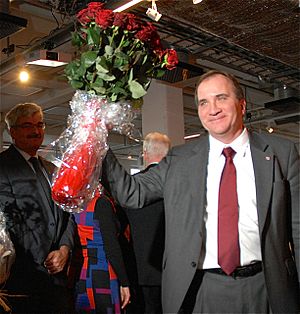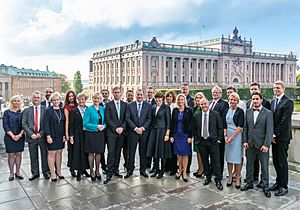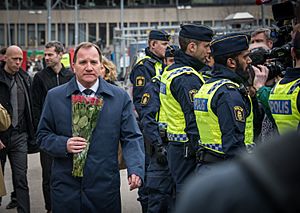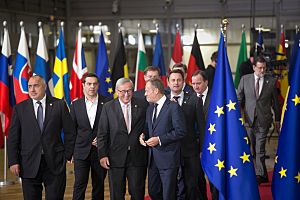Stefan Löfven facts for kids
Quick facts for kids
Stefan Löfven
|
|
|---|---|
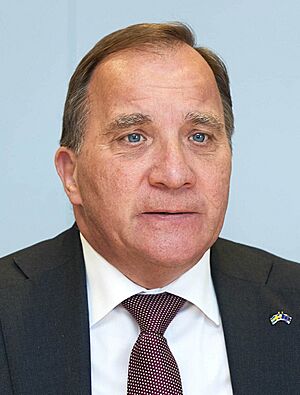
Löfven in 2021
|
|
| Prime Minister of Sweden | |
| In office 3 October 2014 – 30 November 2021 |
|
| Monarch | Carl XVI Gustaf |
| Deputy | Margot Wallström Morgan Johansson Åsa Romson Isabella Lövin Per Bolund |
| Preceded by | Fredrik Reinfeldt |
| Succeeded by | Magdalena Andersson |
| President of the European Socialists | |
| Assumed office 14 October 2022 |
|
| Preceded by | Sergey Stanishev |
| Leader of the Social Democratic Party | |
| In office 27 January 2012 – 4 November 2021 |
|
| Secretary-General | Carin Jämtin Lena Rådström Baastad |
| Preceded by | Håkan Juholt |
| Succeeded by | Magdalena Andersson |
| Leader of the Opposition | |
| In office 27 January 2012 – 3 October 2014 |
|
| Monarch | Carl XVI Gustaf |
| Prime Minister | Fredrik Reinfeldt |
| Deputy | Carina Moberg Mikael Damberg |
| Preceded by | Håkan Juholt |
| Succeeded by | Fredrik Reinfeldt |
| Member of the Riksdag for Västernorrland County |
|
| In office 14 September 2014 – 16 November 2021 |
|
| Preceded by | Agneta Lundberg |
| Succeeded by | Anna-Belle Strömberg |
| Personal details | |
| Born |
Kjell Stefan Löfvén
21 July 1957 Stockholm, Sweden |
| Political party | Social Democratic |
| Spouse |
Ulla Löfven
(m. 2003) |
| Cabinet | Löfven I cabinet Löfven II cabinet Löfven III cabinet |
| Signature | |
| Military service | |
| Allegiance | |
| Branch/service | |
| Years of service | 1976–1977 |
| Rank | Private |
Stefan Löfven (born 21 July 1957) is a Swedish politician. He was the Prime Minister of Sweden from October 2014 to November 2021. Before that, he was the leader of the Swedish Social Democratic Party from 2012 to 2021. Since October 2022, he has been the President of the Party of European Socialists.
After finishing school and serving in the Swedish Air Force, Löfven became a welder. He was very active in trade unions, which are groups that protect workers' rights. He became the first president of a large union called IF Metall in 2006. In 2012, he was chosen to lead the Social Democratic Party.
Löfven became Prime Minister in 2014, leading a government with the Green Party. He was re-elected in 2019 after a challenging election. He faced several political challenges during his time as Prime Minister. In 2021, he announced he would step down. Magdalena Andersson took over as leader of his party and later became Prime Minister.
Contents
Early Life and Education
Stefan Löfven was born on 21 July 1957 in Stockholm, Sweden. His father passed away before he was born. He was placed in an orphanage and later grew up with a foster family in Sollefteå.
His foster father worked as a lumberjack and factory worker. His foster mother was a caregiver. Löfven studied at Sollefteå High School. He also took a welding course and later studied social work at Umeå University, but he did not finish that program.
Becoming a Trade Union Leader
After his military service in the Swedish Air Force from 1976 to 1977, Löfven started working as a welder in 1978. He quickly became involved in his workplace union.
He held many different union roles. In 1995, he became a full-time representative for the Swedish Metalworkers' Union. He worked on important topics like contract negotiations. In 2005, he was chosen as the first chairman of the new union, IF Metall.
Political Journey
Löfven joined the Swedish Social Democratic Party when he was 13 years old. He was active in the party's youth group. In 2006, he joined the main board of the Social Democrats.
Leading the Social Democrats
In January 2012, Stefan Löfven was chosen to be the new leader of the Social Democratic Party. He was officially confirmed as the party leader in April 2013.
He led his party in the 2014 European Parliament election in Sweden. The Social Democrats remained the largest party from Sweden in the European Parliament.
Prime Minister of Sweden (2014–2021)
Löfven led his party in the 2014 Swedish general election. After the election, no single party had a clear majority. He decided to form a government with his party and the Green Party. On 2 October 2014, the Swedish Parliament, called the Riksdag, approved Löfven as Prime Minister of Sweden. He officially took office the next day.
Löfven wanted different political parties to work together. They agreed to cooperate on important areas like the pension system, energy, and national security.
Important Domestic Policies
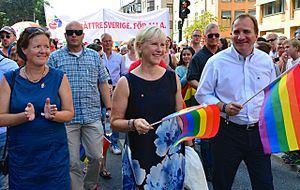
Budget Challenges
In 2014, Löfven's government faced a challenge with its first budget. Other parties did not support it. This led to a political crisis. Löfven initially said there would be a new election. However, he later reached an agreement with several opposition parties. This agreement helped ensure the government's budgets would pass.
Responding to Migration
In 2015, many people seeking safety arrived in Europe, including Sweden. Sweden received over 150,000 people that year. The Löfven government changed Sweden's migration rules to manage the situation. They introduced temporary border controls and identity checks. These changes aimed to better organize the arrival of people and share the responsibility across the country.
National Security Concerns
In 2017, a serious issue came to light regarding sensitive information at the Swedish Transport Agency. Confidential data was exposed, which raised national security concerns. Löfven addressed the situation by making changes to his government. Some ministers resigned, but Löfven himself remained as Prime Minister.
Foreign Policy Decisions
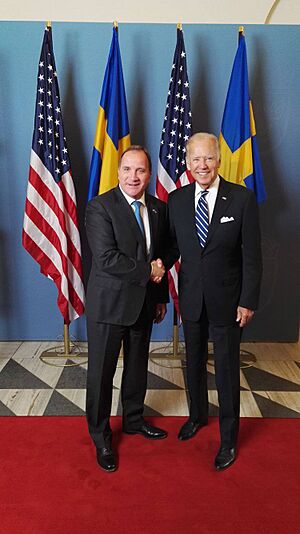
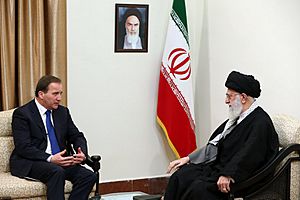
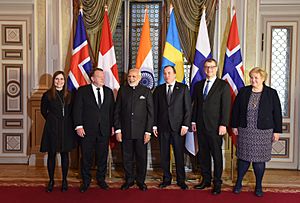

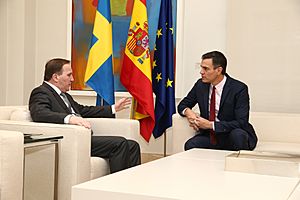
In 2014, Löfven's government decided to officially recognize the State of Palestine. Sweden was the first country in the European Union to do this after becoming a member. This decision was seen as a way to help achieve peace between Israel and Palestine.
Löfven also supported trade agreements between the European Union and the United States. He believed these agreements were important for Sweden's economy. He also visited Iran in 2017 to improve economic ties.
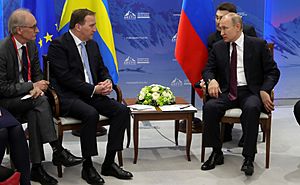
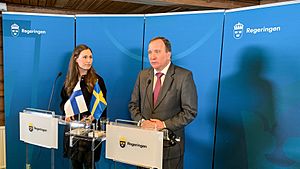
In January 2021, after an attack on the United States Capitol, Löfven called it an "assault on democracy." He hoped for a peaceful return to order.
2018 General Election
The 2018 Swedish general election resulted in a very close outcome. No clear winner emerged. Löfven announced he wanted to remain Prime Minister. However, the Riksdag voted against him, and he had to lead a temporary government.
After a long period of negotiations, Löfven was re-elected as Prime Minister in January 2019. This happened after an agreement was made between several parties. His government, a minority coalition of the Social Democrats and Green Party, continued to lead Sweden.
2021 Government Crisis
In June 2021, Löfven's government faced another crisis. A party that had supported him, the Left Party, withdrew its support. This led to a vote of no confidence in the Riksdag. It was the first time in Swedish history that such a vote caused a government to fall.
Löfven resigned as Prime Minister on 28 June. However, after other attempts to form a government failed, Löfven was given a second chance. On 7 July, the Riksdag voted again, and Löfven was reinstated as Prime Minister.
Stepping Down
On 22 August 2021, Stefan Löfven announced he would step down as party chairman and then as Prime Minister. He did not seek re-election as party leader in November 2021. Magdalena Andersson was chosen to replace him.
Löfven officially resigned as Prime Minister on 10 November 2021. He continued to lead a temporary government until Magdalena Andersson took office on 30 November 2021.
Life After Politics
In 2022, the United Nations Secretary General appointed Löfven to a special board. This board works on making global cooperation more effective.
On 14 October 2022, Löfven was elected President of the Party of European Socialists. This is a group of socialist parties from across Europe.
Löfven has also been a board member of the Harald Edelstam Foundation since April 2022. This foundation works to promote human rights.
Personal Life
Löfven enjoys sports. He supports the ice hockey team Modo and the football clubs Tottenham Hotspur and GIF Sundsvall. He is married to Ulla Löfven and has two stepchildren. He does not have any biological children.
Honours and Awards

 Legion of Honour, Commander, awarded by the President of France (8 September 2023)
Legion of Honour, Commander, awarded by the President of France (8 September 2023)
 H. M. The King's Medal, 12th size in gold on chain. (6 June 2022).
H. M. The King's Medal, 12th size in gold on chain. (6 June 2022).
 Order of Prince Yaroslav the Wise, Second Class, awarded by the President of Ukraine (2021)
Order of Prince Yaroslav the Wise, Second Class, awarded by the President of Ukraine (2021)- Aaron Isaac Award, from the Jewish Congregation in Stockholm (2021)
See also
 In Spanish: Stefan Löfven para niños
In Spanish: Stefan Löfven para niños
 | Jackie Robinson |
 | Jack Johnson |
 | Althea Gibson |
 | Arthur Ashe |
 | Muhammad Ali |


